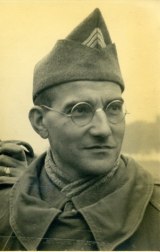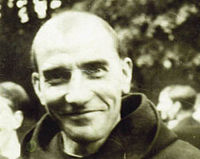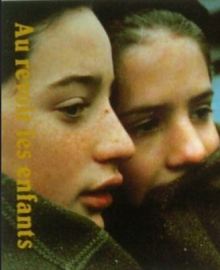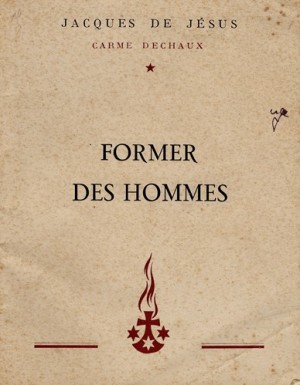
Former des hommes, by Jacques de Jésus, seems an unlikely contender to be part of the Liberation Collection. It is a modestly produced booklet of barely 38 pages, whose contents are of a spiritual nature. So, why was this book selected to be part of the Liberation Collection, whose aim is to gather books and pamphlets written about the Second World War, and its immediate aftermath, in Francophone countries?
The answer lies in the short biography on the last page of the publication. Jacques de Jésus, born Lucien Bunel, was a Catholic priest and Carmelite who was arrested in 1944 for hiding Jewish children in the school that he had founded in Avon, France. The events leading up to his arrest inspired Louis Malle’s critically acclaimed film Au revoir les enfants.
 Born in 1900 into a large religious family near Rouen, in Normandy, Jacques de Jésus decided very early on to dedicate his life to religion and was ordained at the age of 25. He was a “Carme déchaux” (Discalced Carmelite), a member of a religious order which owes its name to its foundation in Israel in the 12th century, on the Mount Carmel, where had resided the biblical prophet Elijah. They were called ‘discalced’, ‘without shoes’, after a reform re-establishing the value of poverty. The shield of the Carmelites, represented on the cover of the publication, features three stars on the white coat and brown habit of the monks, surmounted by a flaming cross -the three stars referring to either the three theological virtues of Faith, Hope, and Charity, or the three religious vows of Poverty, Obedience and Chastity.
Born in 1900 into a large religious family near Rouen, in Normandy, Jacques de Jésus decided very early on to dedicate his life to religion and was ordained at the age of 25. He was a “Carme déchaux” (Discalced Carmelite), a member of a religious order which owes its name to its foundation in Israel in the 12th century, on the Mount Carmel, where had resided the biblical prophet Elijah. They were called ‘discalced’, ‘without shoes’, after a reform re-establishing the value of poverty. The shield of the Carmelites, represented on the cover of the publication, features three stars on the white coat and brown habit of the monks, surmounted by a flaming cross -the three stars referring to either the three theological virtues of Faith, Hope, and Charity, or the three religious vows of Poverty, Obedience and Chastity.
Former des hommes, [Paris] : Dépôt Procure générale, [1946]. Liberation.c.1893
In 1934 he founded and headed a school, the Petit Collège Sainte-Thérèse de l’Enfant-Jésus, in Avon (Seine-et-Marne). There he taught literature and gained respect for his dedication and creative teaching methods.
During the Second World War, Père Jacques, who had always shown an interest in social activism, was quick to join the Resistance, while carrying on his school activities. He joined a clandestine group linked with the Vélite-Thermopyles Resistance network, an intelligence network active in occupied France and part of ‘La France Libre’. He used his school as a cover for his resistance work, which included hiding STO objectors (Service de Travail Obligatoire), who were Frenchmen trying to avoid being drafted for forced labour for the Germans. He also helped Lucien Weil, a Jewish natural sciences teacher who had been banned from teaching at the Lycée de Fontainebleau, by allowing him to teach a few classes at the Petit Collège. Père Jacques also regularly helped place Jewish children with Catholic families, saving many lives in the process.
On 15 January 1944, after a denunciation, he was arrested, along with the three Jewish children he was hiding in his school: Hans-Helmut Michel, Jacques Halpern and Maurice Schlosser, aka ‘Bonnet’, ‘Dupré’ and ‘Sabatier’. The children were taken to Auschwitz and died in the gas chamber. As Père Jacques was led away by the Gestapo in front of his pupils, he uttered the words that later became the title of Louis Malle’s 1987 film: ‘Au revoir, les enfants… A bientôt!’ (Goodbye, children… See you soon!)
Père Jacques spent the following eighteen months in a variety of camps, including the unspeakably brutal Neue Bremm and Saarbrücken and was finally transported to Gusen. This dark period was lit up by many examples of his seemingly boundless charity and self-giving personality. Shortly after the liberation of the camp of Mauthausen, he died in Linz, exhausted and sick, on 2 June 1945.
Père Jacques has been honoured by both Catholics and Jews as a ‘martyr of charity’. He was awarded a medal as “Righteous Among Nations” by the State of Israel in 1985, and the case for his canonisation was opened in 1997.

This story inspired Louis Malle’s award-winning film Au revoir les enfants, released in 1987, and the main character of Père Jean was modelled on real-life Père Jacques. The film was largely autobiographical, as director Louis Malle had attended the Petit Collège at the same time as the three children and he witnessed his schoolmates and teacher being taken away by the Gestapo. He admitted having based the friendship of the two main characters on his regret for not getting closer to the Jewish children before they were deported, especially Bonnet.
“I kept to what I believe were my memories but bear in mind that it is a little reinvented,” he explained to Positif magazine shortly after the film was released. “My relationship with Bonnet in the film is more complex and interesting than it was in reality, as what we had lacked was time, and I suppose that part of my memories stems from a guilt which I have held on to and that has had an influence on my life.” An extended interview with Louis Malle on his experience can be viewed here.
Sophie Dubillot
Further reading:
Jacques de Jésus, Former des hommes, [Paris] : Dépôt Procure générale, [1946] Liberation.c.1893
Georges Duret : prêtre, philosophe, poète, martyr (1887-1943), Paris : Éditions du témoignage chrétien, [1947] Libération.b.341
Les Déportés d’Avon : enquête autour du film de Louis Malle, Au revoir les enfants, Paris : La Découverte, 1989.
Henry & Grégoire Haas, Père Jacques de Jésus : la pédagogie de la liberté, Paris : Livre ouvert, 2011 (61 p.)
Alexis Neviaski, Le père Jacques : carme, éducateur, résistant. Paris : Taillandier, 2015 C215.c.9522
P. Philippe de la Trinité, Le Père Jacques Martyr de la Charité, Paris : Desclée de Brouwer, 1947, Liberation.c.2425
Jean Trolley, Camille W. de Prévaux, Au revoir les enfants : la véritable histoire du père Jacques : prêtre, déporté, Juste parmi les nations, Monaco : Éditions du Rocher, 2019, C215.c.8879 [graphic novel]
Interview of Film Director Louis Malle on his film ‘Au revoir les enfants’. Revue Positif, n°320, Octobre 1987.
Other books in the Liberation Collection on priests during the war:
Paris aux liens : témoignages de prêtres. Paris (1, Rue des Poitevins, VIe) : Aux Éditions du Seuil, [1944] Libération.a.142
Alzin, Josse, Prêtres de Dieu livrés aux bêtes et au feu, Paris ; Marchienne-Au-Pont : Aux Éditions du Rendez-vous, [1945] Libération.b.194
Pélissier, Jean, Pour Dieu et la patrie: prêtres religieux victimes des nazis. Préface de S. Em. le cardinal Saliège. Paris : Bonne Presse, 1946 Libération.c.136
Alzin, Josse, Martyrologe 40-45 ; Le calvaire et la mort de 80 prêtres belges et luxembourgeois. Arlon : Éditions J Fasbender, 1946 Libération.c.1363
Online sources
- PèreJacques.org (English): http://perejacques.org/dates.html
- Jacques de Jésus (French): http://jacquesdejesus.com/?page_id=459
- French children of the holocaust, a memorial: https://phdn.org/archives/holocaust-history.org/klarsfeld/French%20Children/html&graphics/T1697.shtml
Filmography
- Interview with Louis Malle – here
- Au revoir les enfants, Directed by Louis Malle, 1987, winner of 27 awards and 12 nominations


